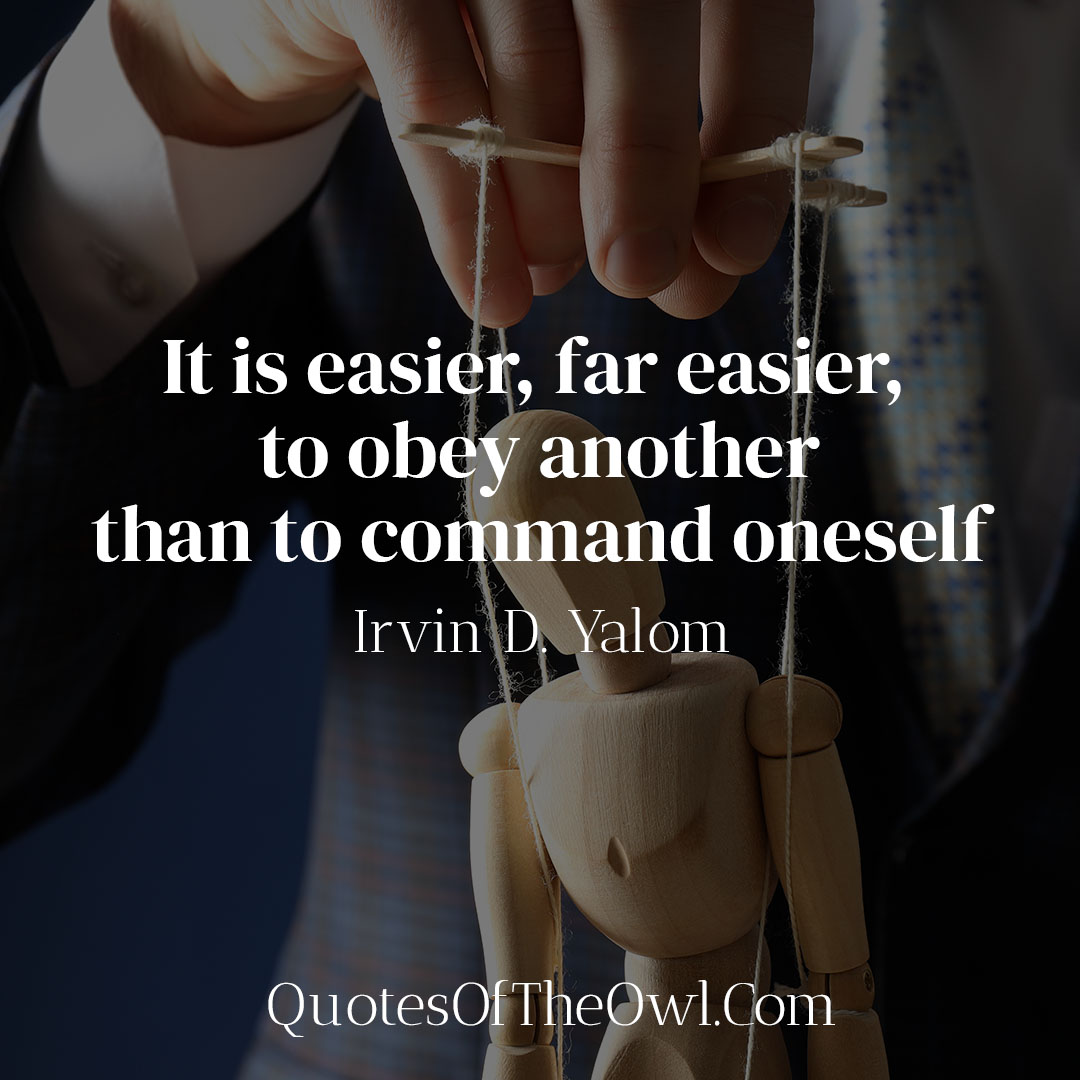It is easier, far easier, to obey another than to command oneself – Irvin D. Yalom
Irvin D. Yalom, a renowned psychiatrist and author, is known for his insightful reflections on human behavior and the complexities of the human psyche. One of his notable quotes, “It is easier, far easier, to obey another than to command oneself,” delves deep into the intricacies of human nature and the dynamics of obedience versus self-discipline.
Analyzing the Quote
At first glance, Yalom’s quote appears simple, yet it encapsulates a profound truth about human behavior. Obedience, the act of following directives or instructions from others, often seems effortless compared to the arduous task of self-command, which involves regulating one’s own actions, thoughts, and emotions.
Exploring its Implications
The quote implies that many individuals find it more convenient to conform to external authority or societal norms rather than exerting the effort required to govern their own lives. This tendency towards obedience can stem from various factors, including social conditioning, fear of judgment, or a desire for acceptance.
The Meaning behind the Quote
Interpretation in Different Contexts
In different contexts, Yalom’s quote takes on nuanced meanings. In a societal context, it highlights the prevalence of conformity and the reluctance of individuals to challenge established norms. In a personal context, it underscores the struggle for self-mastery and the difficulty of resisting temptations or impulses.
The Challenges of Self-Command
Psychological Perspective
From a psychological perspective, self-command encompasses aspects of self-regulation, impulse control, and emotional management. It requires introspection and the ability to override immediate gratification in pursuit of long-term goals.
Behavioral Perspective
Behaviorally, self-command involves adopting proactive habits and routines that align with one’s values and aspirations. However, the human psyche is susceptible to cognitive biases and irrational tendencies, making self-command a continual challenge.
Factors Influencing Obedience and Self-Command
Social Influences
Social influences, such as peer pressure or cultural norms, play a significant role in shaping obedience and self-command. The fear of social rejection or the desire for approval can influence one’s behavior and decision-making processes.
Personal Beliefs and Values
Individuals’ beliefs and values also influence their willingness to obey external authority or exercise self-command. Those who prioritize autonomy and personal integrity may resist conforming to societal expectations and instead strive to govern their own lives.
The Importance of Self-Command
Personal Growth and Development
Cultivating self-command is essential for personal growth and development. It fosters resilience, self-reliance, and adaptability in the face of challenges. By taking ownership of one’s choices and actions, individuals empower themselves to lead fulfilling and purposeful lives.
Achieving Autonomy and Independence
Self-command is synonymous with autonomy and independence. It liberates individuals from the shackles of external control and empowers them to chart their own course in life. Rather than being at the mercy of external forces, they become the architects of their destiny.
Strategies for Cultivating Self-Command
Self-Awareness and Reflection
Self-awareness is the cornerstone of self-command. By cultivating mindfulness and introspection, individuals gain insight into their thoughts, emotions, and behaviors. This self-awareness enables them to identify areas for improvement and make intentional choices aligned with their values.
Goal-Setting and Self-Discipline
Setting clear goals and implementing self-discipline are key strategies for fostering self-command. Breaking down goals into manageable steps and holding oneself accountable for progress cultivates a sense of mastery and control over one’s life.
Overcoming the Allure of Obedience
Recognizing the Limitations of Blind Obedience
While obedience may offer temporary comfort or security, blindly following others’ directives can lead to a loss of autonomy and authenticity. It is essential to question authority and think critically rather than relinquishing control over one’s life.
Embracing Individuality and Autonomy
True fulfillment and happiness come from embracing one’s individuality and exercising autonomy over one’s choices. By honoring their unique strengths, values, and aspirations, individuals can break free from the confines of conformity and live authentically.
Real-Life Examples and Anecdotes
Throughout history, countless individuals have exemplified the power of self-command in the face of adversity. From civil rights leaders challenging systemic injustice to entrepreneurs defying conventional wisdom, their stories inspire us to reclaim agency over our lives and pursue our passions fearlessly.
Conclusion
In conclusion, Irvin D. Yalom’s quote, “It is easier, far easier, to obey another than to command oneself,” serves as a poignant reminder of the inherent challenges of self-mastery and the allure of conformity. By understanding the complexities of human behavior and actively cultivating self-command, individuals can liberate themselves from the constraints of external control and forge their own path towards fulfillment and autonomy.

